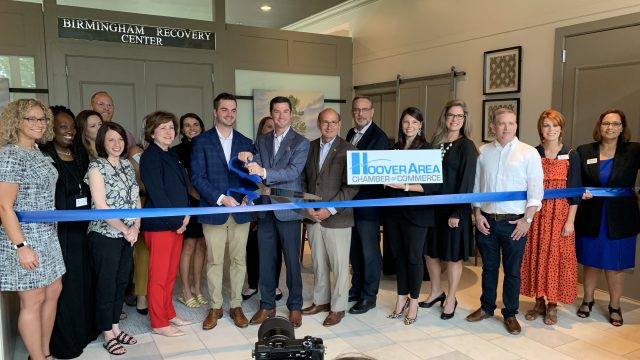
By Ryan Michaels
Amid a significant increase in overdose deaths in Jefferson County, state and local officials gathered Tuesday to participate in a ribbon cutting ceremony for Birmingham Recovery Center (BRC), a new addiction treatment facility for the area.
In 2020, Jefferson County doubled its Fentanyl overdose deaths from 2019; and in the first quarter of 2021, the area saw an increase of 94 percent deaths from the previous year’s quarter. Among Black people alone, the number of deaths is up 72 percent.
Fentanyl is appearing mixed in with other drugs, used to cut substances like cocaine and methamphetamine, meaning a lot of people are using the drug without even knowing it.
Alabama Mental Health Commissioner Kimberly Boswell, in Hoover, focused on the local overdose problem and thanked BRC for its work.
“As most of you know, overdoses continue to happen, and we are losing lots and lots of people to addiction, and honestly for me, that’s just unacceptable,” Boswell said. “I’m really grateful for [BRC] today for having the courage, the passion and the commitment to figure out what you can do in your community to support recovery.”
Colin Harris, managing director of BRC, said that improving people’s lives is an important part of their mission. “At [BRC], we hope to not only help individuals recover from substance abuse disorder and mental health issues,” Harris said, “but help each client change their lives and achieve their goals.”
The center is an outpatient treatment center, which means that it does not have residential patients. The facility is mostly about “bridging the gap” for people finishing detox, who might need help getting back into their normal life, according to Tim Carpenter, one of the organization’s psychiatrists.
“It’s focused on developing the skills that clients can have in order to stay in treatment, developing relationships with therapists, as well as treating some of the psychiatric and addiction problems that it may be difficult to find on your own.”
Hoover Mayor Frank V. Brocato said recovery centers can improve lives in the community.
“We’re grateful to have organizations like this that people can come to and have an opportunity to change their lives because their lives are devastating not only their lives, but the lives of their families,” Brocato said.
Ian Henyon, executive director of BRC, said treatment facilities are necessary but often looked at skeptically.
“I think we can all agree that there is a need for a program like [BRC] in this community, but just fulfilling that need in the marketplace is not enough,” Henyon said. “There is a credibility problem within the addiction treatment field, and starting today, we’re going to change that. Starting today, we are going to change the way that individuals and families experience addiction treatment in this community.”
Brocato said the community’s addiction problems don’t stop outside Birmingham’s city limits.
“Many think that [addiction] just affects the inner city and the drug houses across the country. No, it happens across the entire socio-economic spectrum, and it’s such a problem that when I became mayor, the four mayors over the mountain…where you would think that the addiction problem would not occur in those locations, it might be as bad as anywhere.”
For more visit the Jefferson County Department of Health at https://www.jcdh.org/SitePages/Programs-Services/CommunityHealth/SubstanceUseAndAddiction/NaloxoneTraining.aspx.



